My headstock is a flat 15 mm, I think the lighting in the picture makes that allusion. I can only guess that with a tapered headstock the holes are square to the back and the posts exit at a slight angle.peter havriluk wrote: ↑Fri May 22, 2020 1:08 am John...with a tapered headstock and 3x3 tuners, how can I deal with the taper and keep the posts at right angles to the headplate surface? I like the idea of a tapered headstock but I have no idea of what considerations I need to make in order for the tuners to be happy.
Thanks!
Koa/Bear Claw sitka 00 12 fret short scale.
-
John Parchem
- Posts: 2746
- Joined: Fri Dec 23, 2011 8:33 pm
- Location: Seattle
- Contact:
Re: Koa/Bear Claw sitka 00 12 fret short scale.
-
peter havriluk
- Posts: 984
- Joined: Sun Jul 29, 2012 12:30 pm
- Location: Granby, CT
Re: Koa/Bear Claw sitka 00 12 fret short scale.
John, thanks for answering. Might make a test piece and experiment a bit.
Peter Havriluk
-
John Parchem
- Posts: 2746
- Joined: Fri Dec 23, 2011 8:33 pm
- Location: Seattle
- Contact:
Re: Koa/Bear Claw sitka 00 12 fret short scale.
Usually I am Ok with visual lines in wood as they reflect wood as a natural product. However as I was starting to clean up the neck I could not get past a visual flaw in the spanish cedar of my neck. It looks like a crack put it is not; a shaving from that area did not separate. Still I could not get over it so I made a new neck out of some really nice flamed mahogany that I had. I did not take pictures making the neck, for the most part I followed the same process. The neck blank was thicker than my previous neck blank so I had the flexibility to put the end of the scarf joint right at the nut (so ultimately under the valute. Given that the head stock veneer covers the other end of the scarf, it worked out perfect.
Old neck with flaw
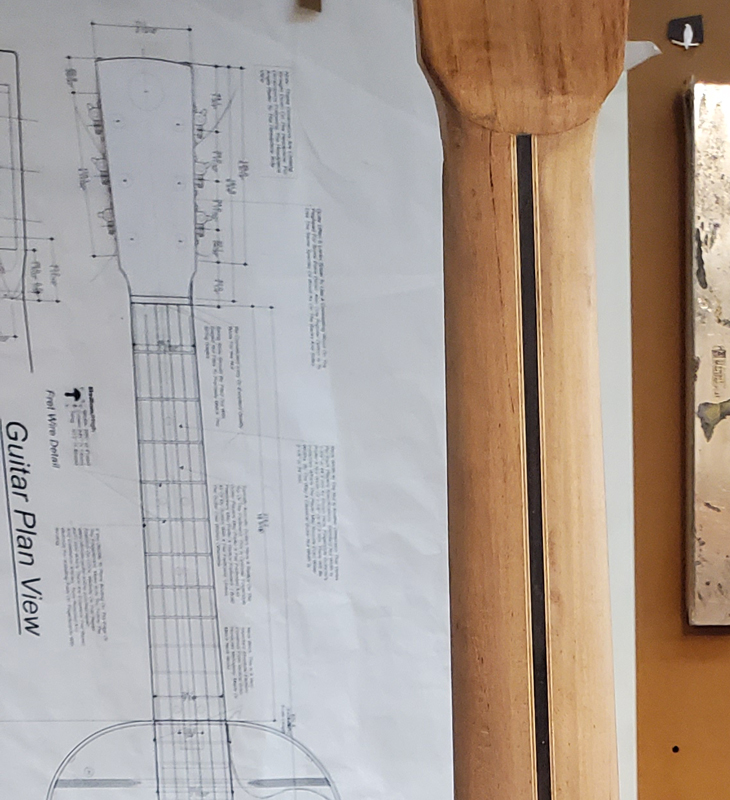
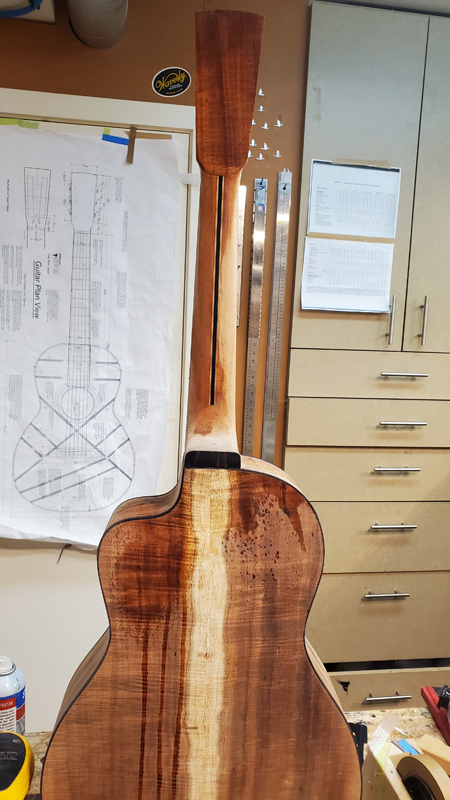
New neck
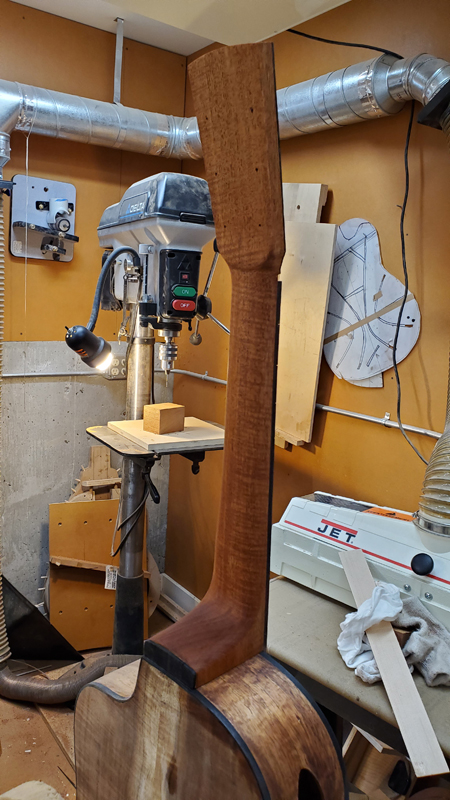
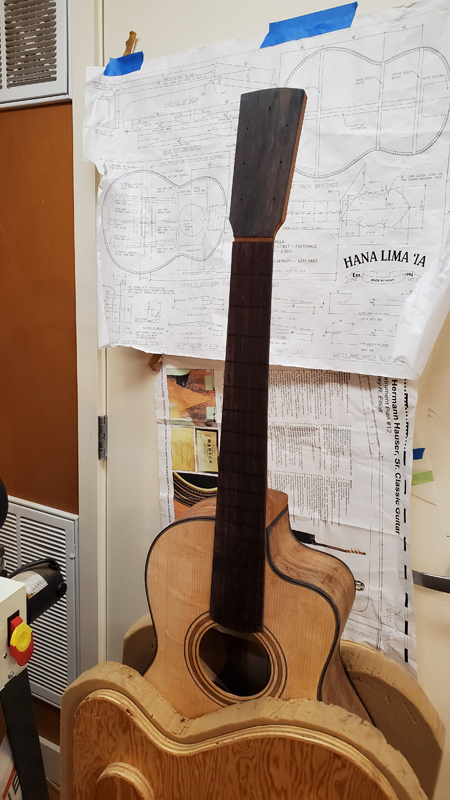
Old neck with flaw


New neck


-
John Parchem
- Posts: 2746
- Joined: Fri Dec 23, 2011 8:33 pm
- Location: Seattle
- Contact:
Re: Koa/Bear Claw sitka 00 12 fret short scale.
While writing this post I am listening to a norwegen Bluegrass band. It sound so fresh making me remember the times in 70s that I went to the Bean Blossom Festival in Indiana. They are really good.
I am in the construction final steps for this guitar. I drilled out the tuner holes. I already had pilot holes from my template. I drilled the holes for the shaft on my drill press and reamed out the wider hole for the bushing with Peghead Bushing Reamer from stewmac. They sell five of these covering most of the tuning machines.
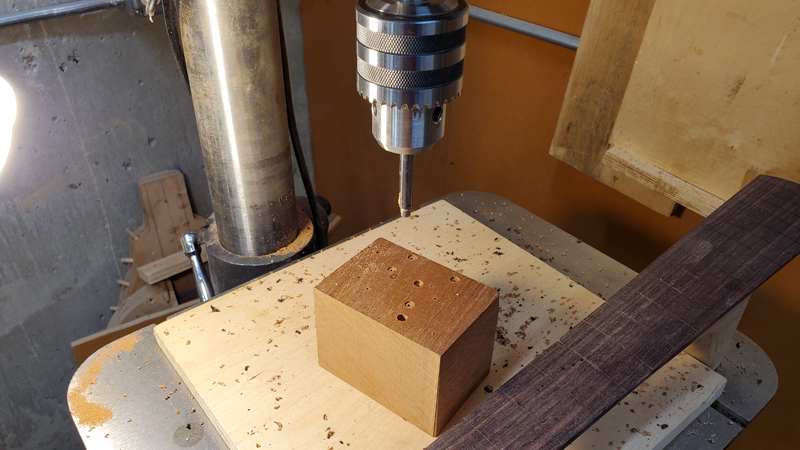
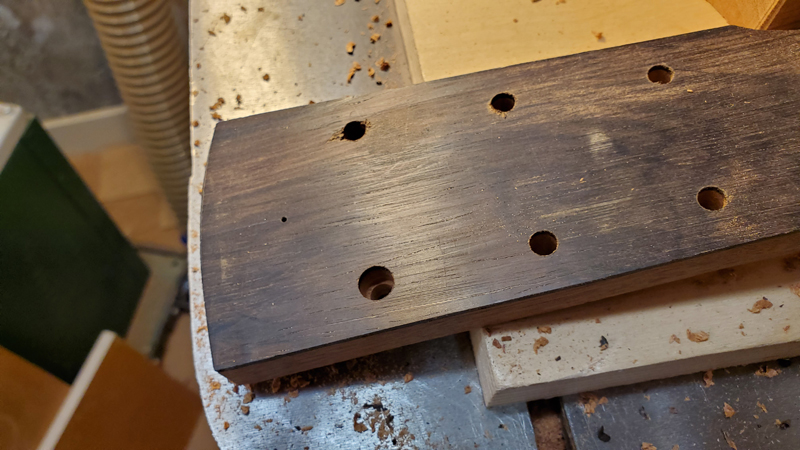
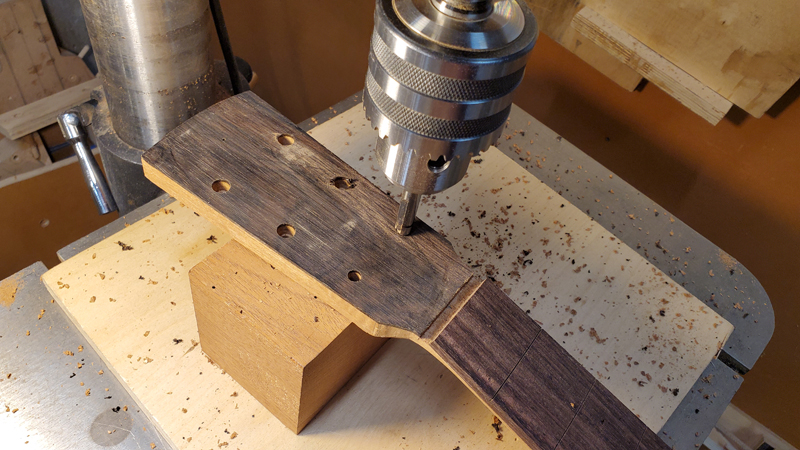
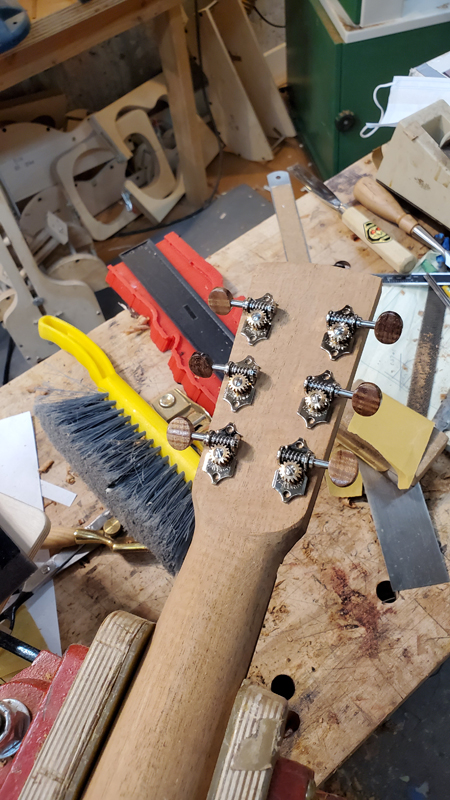
I finally had to tackle inlaying the requested initials in the fretboard. The details were not too fine to route they were very hard to mark as there were some tight spaces forcing me to a .3 mm lead pencil to mark. Being able to see where to route is everything when inlaying. You mind is also always trying to fool you when you can not see clearly. In any case it came out OK.
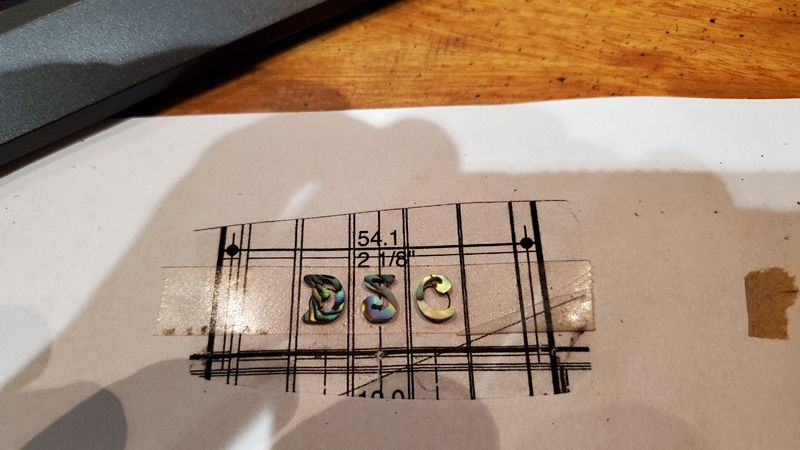
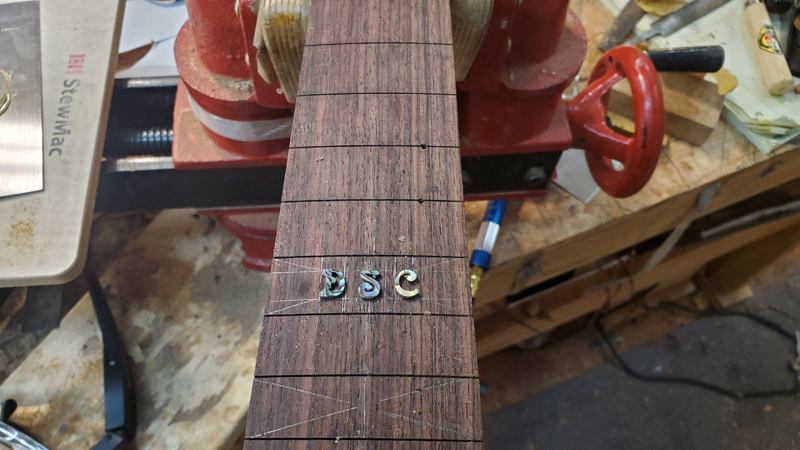
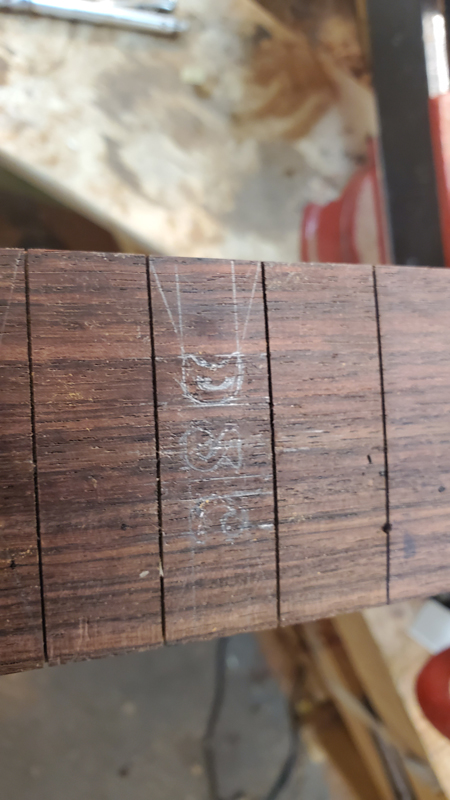
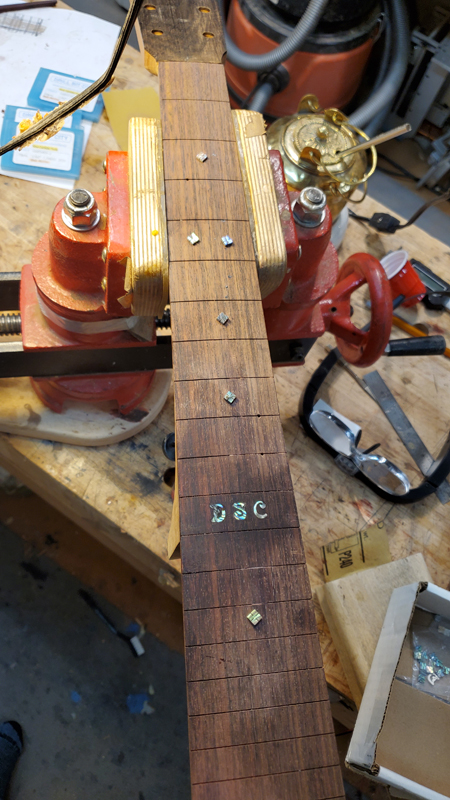
I also laid out some diamonds and cut the channel with a scalpel and a mortise chisel.
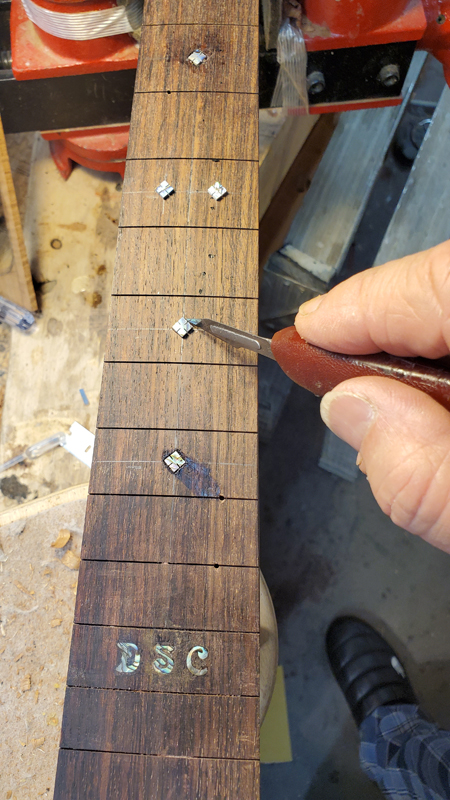
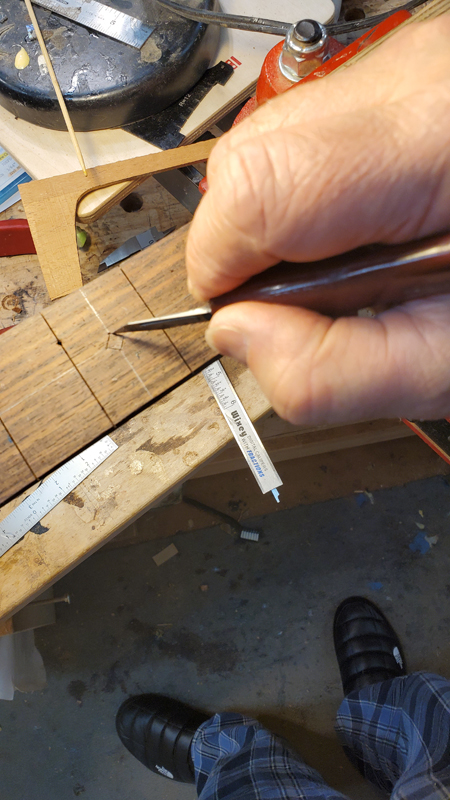
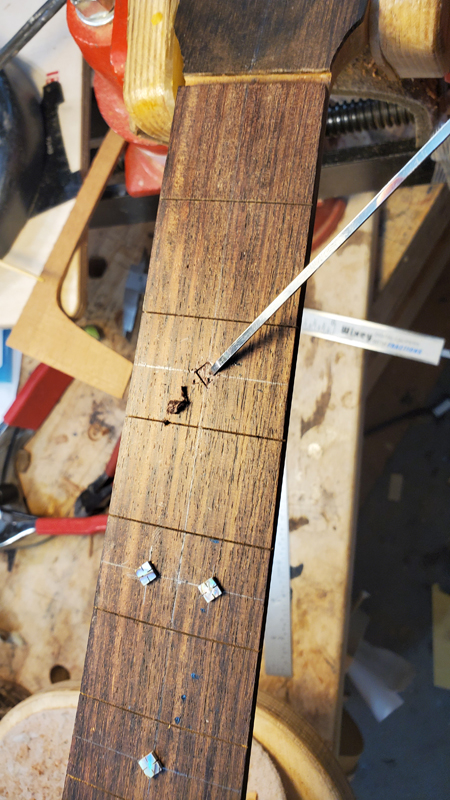
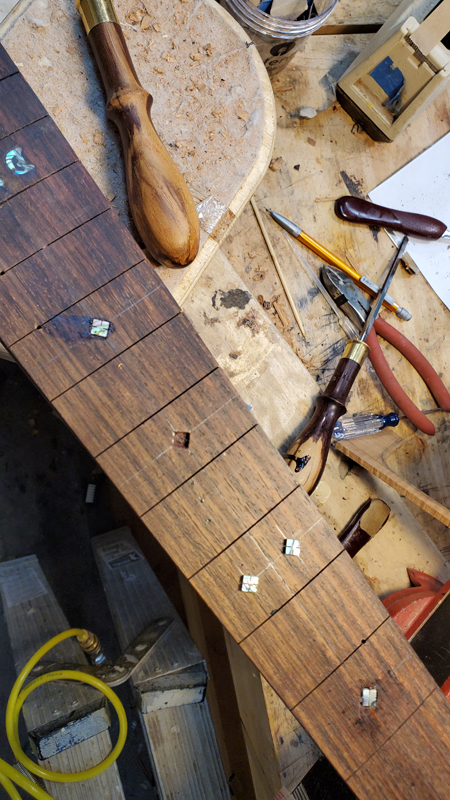
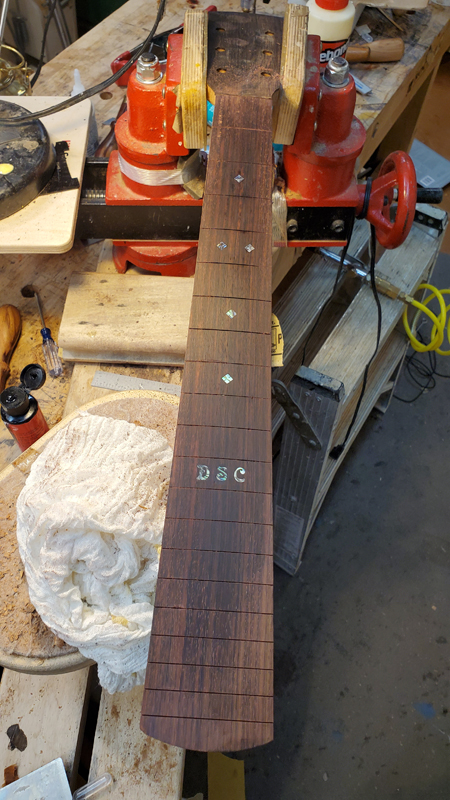
On to the logo, I have shown this before. I know every cut and turn. It still takes about an hour of cutting. My goal is a perfect fit after cutting out all the pieces. In the past I spent a lot of time filing the pieces to get them to fit. Two issues, not staying on the line and more importantly keeping the saw perfectly square so the cut is not tapered. I have to say this was my best fit.
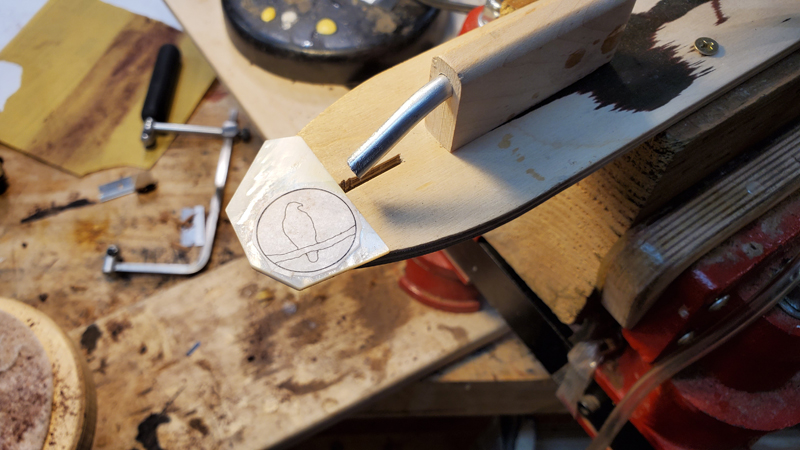
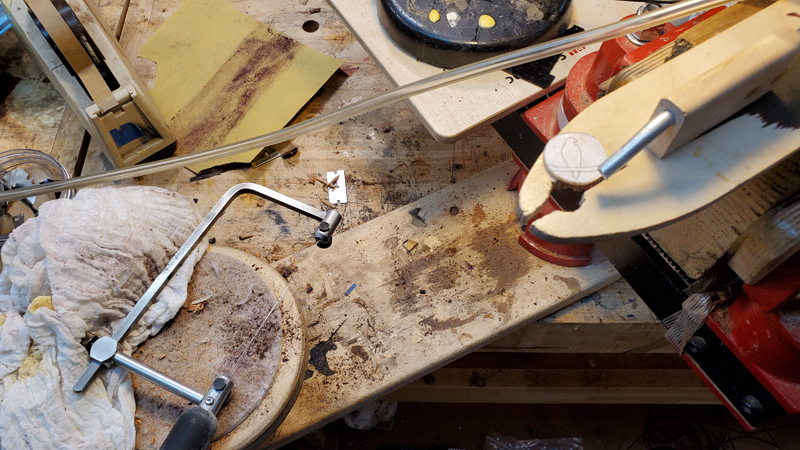
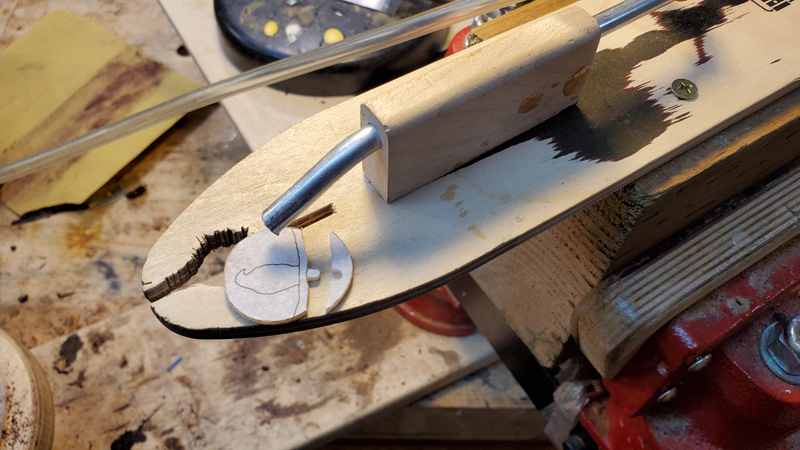
I cut half one way, I then start at the other end. I do not want to make the turn at the beak.
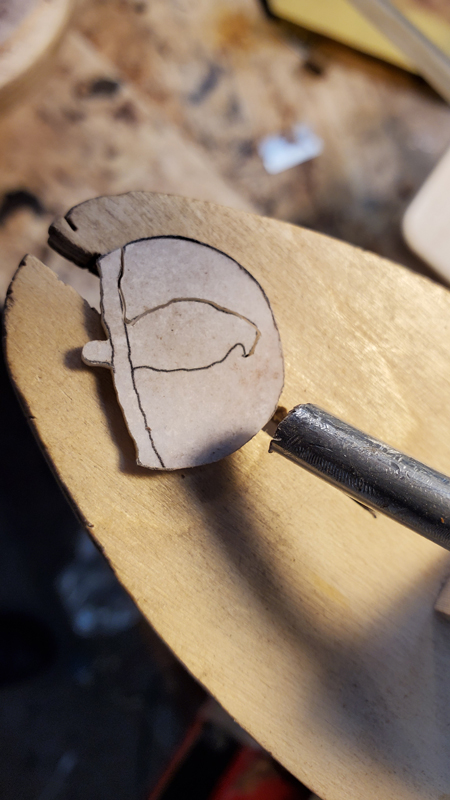
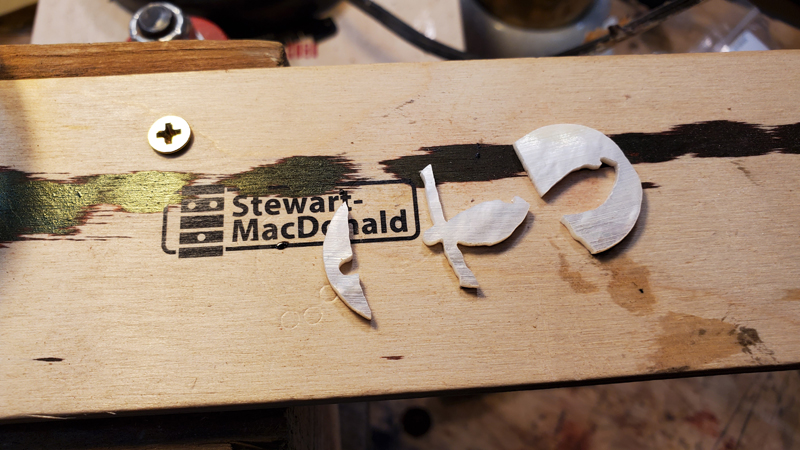
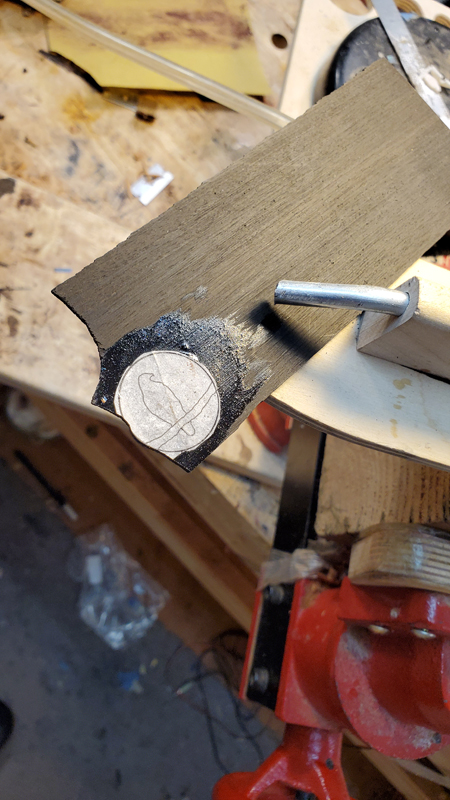
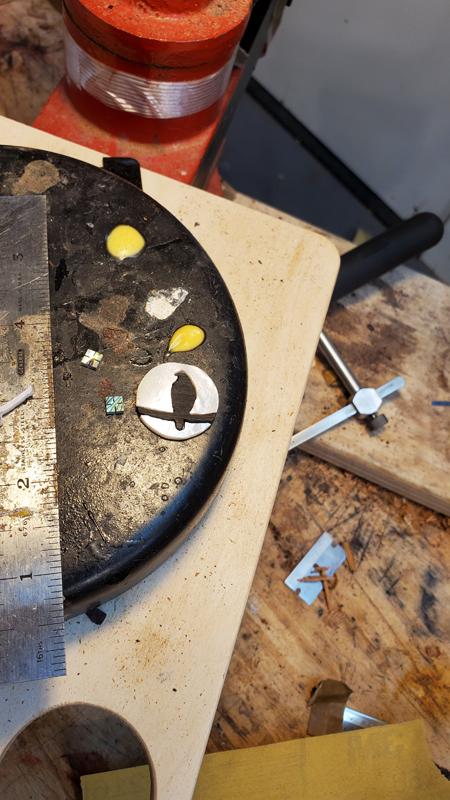
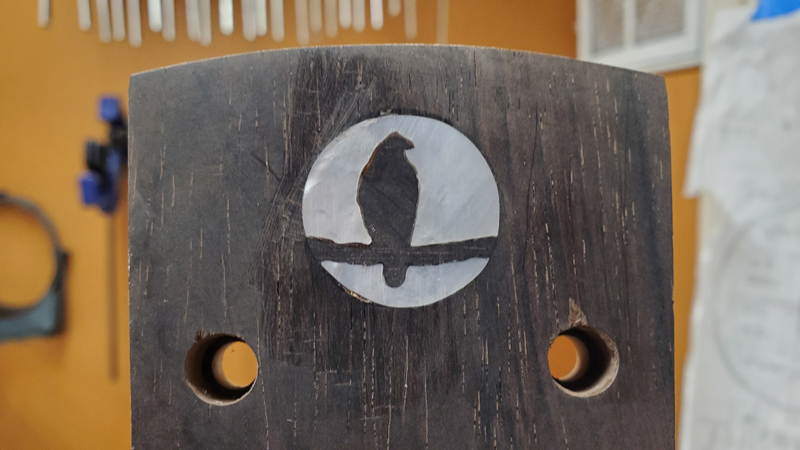
Ready for sanding prep.
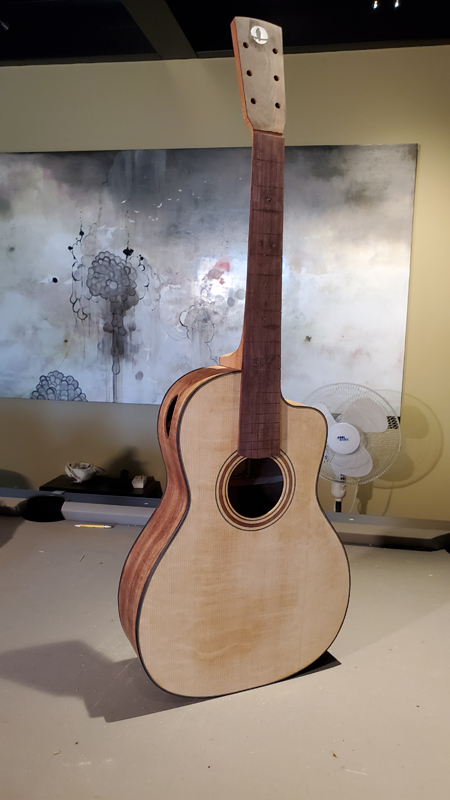
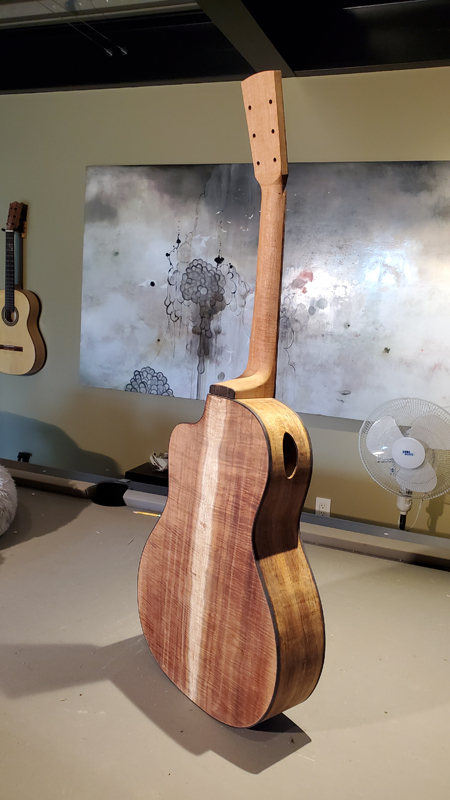
After a day of prep, I put a coat of shellac on. I will sand it off, but it really helps me to find areas that are not quite level. Also it lets me see the color.
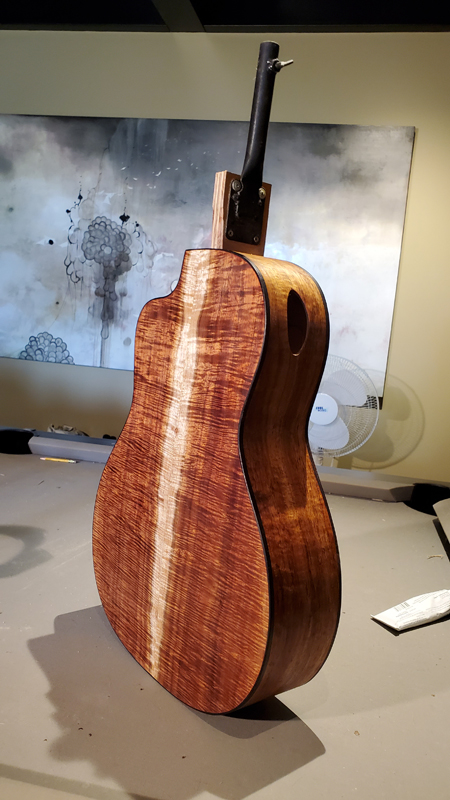
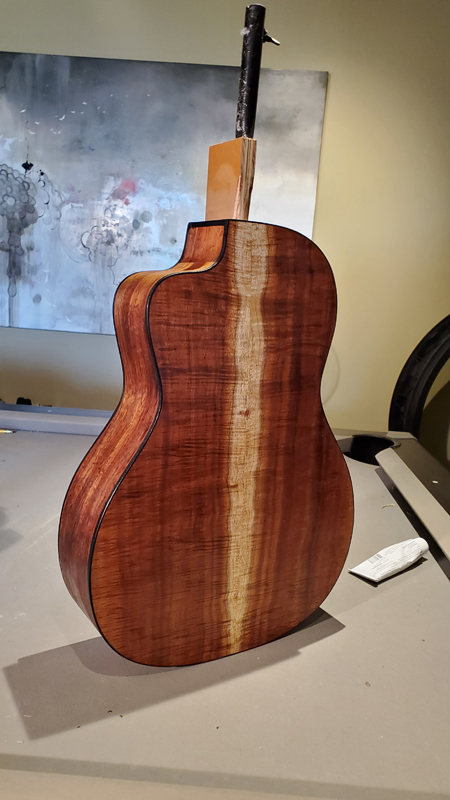
I am in the construction final steps for this guitar. I drilled out the tuner holes. I already had pilot holes from my template. I drilled the holes for the shaft on my drill press and reamed out the wider hole for the bushing with Peghead Bushing Reamer from stewmac. They sell five of these covering most of the tuning machines.




I finally had to tackle inlaying the requested initials in the fretboard. The details were not too fine to route they were very hard to mark as there were some tight spaces forcing me to a .3 mm lead pencil to mark. Being able to see where to route is everything when inlaying. You mind is also always trying to fool you when you can not see clearly. In any case it came out OK.




I also laid out some diamonds and cut the channel with a scalpel and a mortise chisel.





On to the logo, I have shown this before. I know every cut and turn. It still takes about an hour of cutting. My goal is a perfect fit after cutting out all the pieces. In the past I spent a lot of time filing the pieces to get them to fit. Two issues, not staying on the line and more importantly keeping the saw perfectly square so the cut is not tapered. I have to say this was my best fit.



I cut half one way, I then start at the other end. I do not want to make the turn at the beak.





Ready for sanding prep.


After a day of prep, I put a coat of shellac on. I will sand it off, but it really helps me to find areas that are not quite level. Also it lets me see the color.


Re: Koa/Bear Claw sitka 00 12 fret short scale.
Nice job John. But Woooh, what does that koa shine.
Sit is the sunlight and just gaze at the colors!
Herman
Sit is the sunlight and just gaze at the colors!
Herman
-
John Parchem
- Posts: 2746
- Joined: Fri Dec 23, 2011 8:33 pm
- Location: Seattle
- Contact:
Re: Koa/Bear Claw sitka 00 12 fret short scale.
Thanks Herman, that is an especially nice set of Koa. I bought it cheap at a luthiers auction after most had spent their money. I felt so guilty that I tried to up my own bid.
I have strung up the guitar. Mostly straight forward construction. I did a good job masking the bridge area. To remove the tape I put the bridge in place with the index pins, scored the finish around the bridge with a scalpel and lifted the tape from the center. I did a touch of clean up with a chisel and level sanded the finish around the bridge. With the tape slightly high the finish was not completely leveled close to the bridge. With all in place I glued it on with my vacuum clamp.
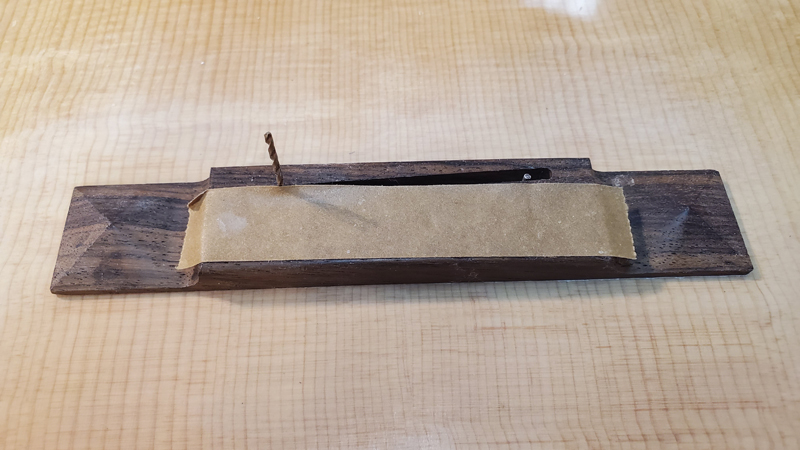
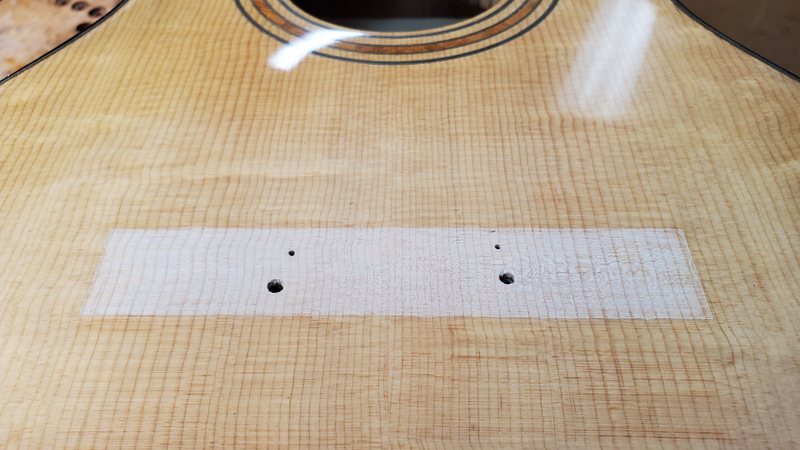
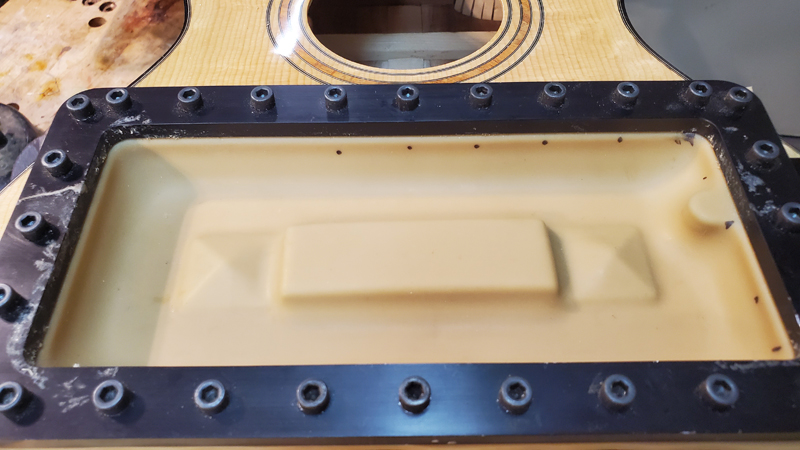
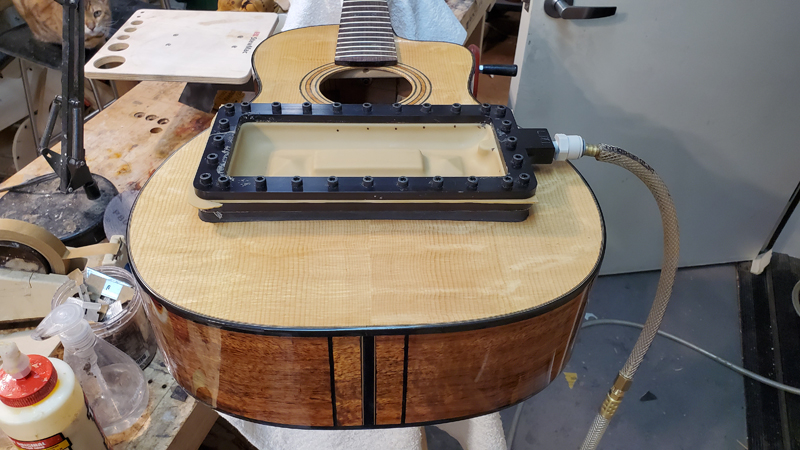
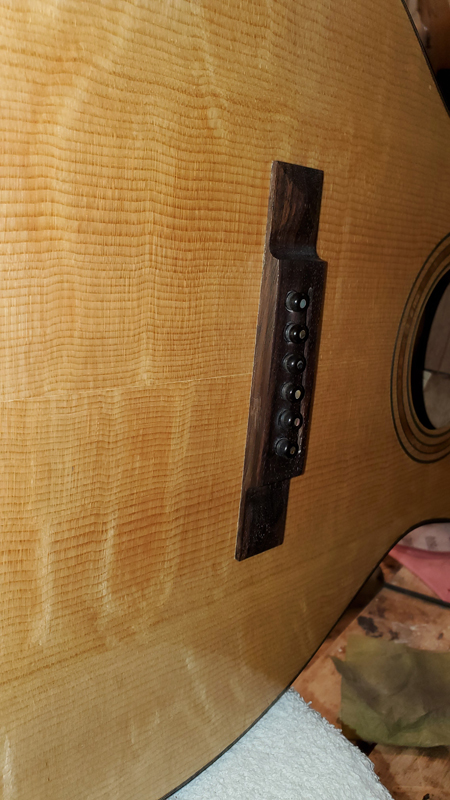
I use my Luthiers Friend Thickness Sander to take my nut blank to a tight fit. I leave it tight enough so that I can clean the bone with some 400 grit sandpaper.
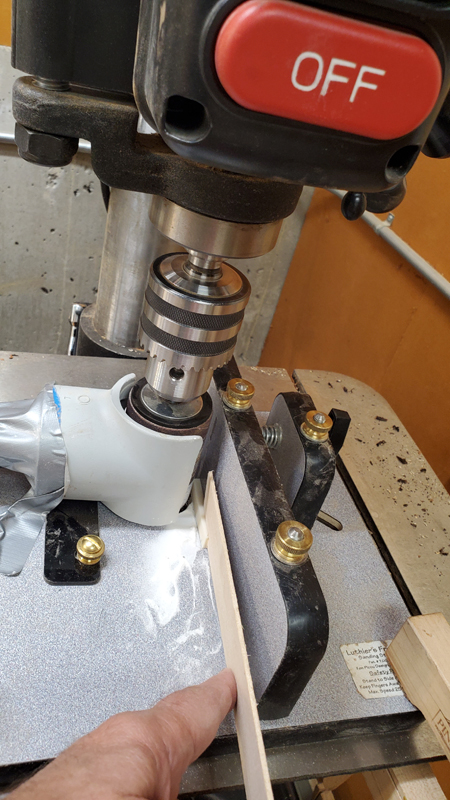
With the nut thicknessed and cut to length I use a jig from GMC Luthiers Tools to help make the nut. The tool is really cool it is adjusted to the depth of the nut slot and uses two separate sized templates to first shape the nut for height and the second template is for the depth of the nut slot.
Two templates one slightly bigger than the other
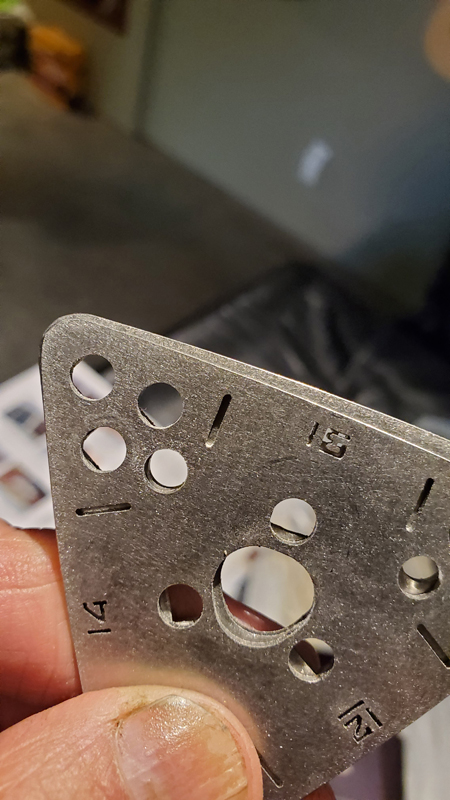
Use the larger template in their nut vice to size the nut.
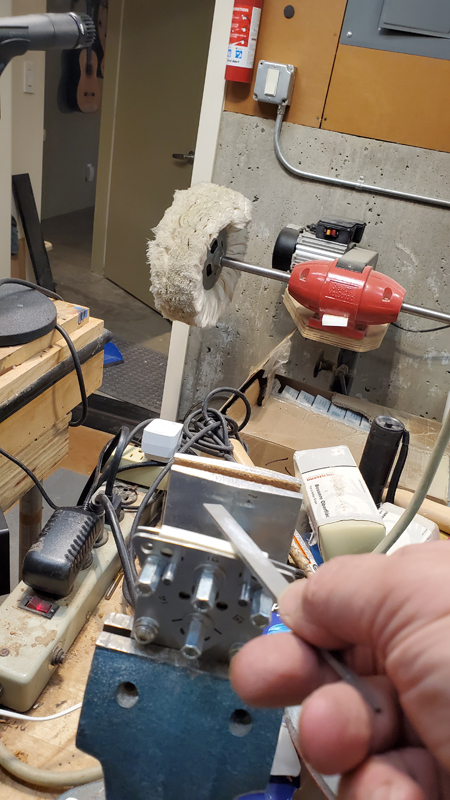
With the nut sized I string the two E strings to mark where I want them.
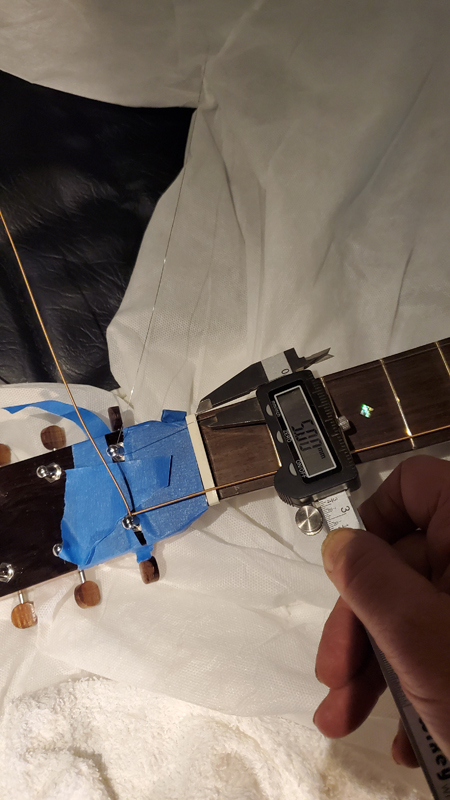
I switch out to the string height template and install the correct string spacing guide. With the E strings marked I just pick the slots in the guide that gives me six strings and lines up with the two E strings. I cut all of the slots to depth with a razor saw.
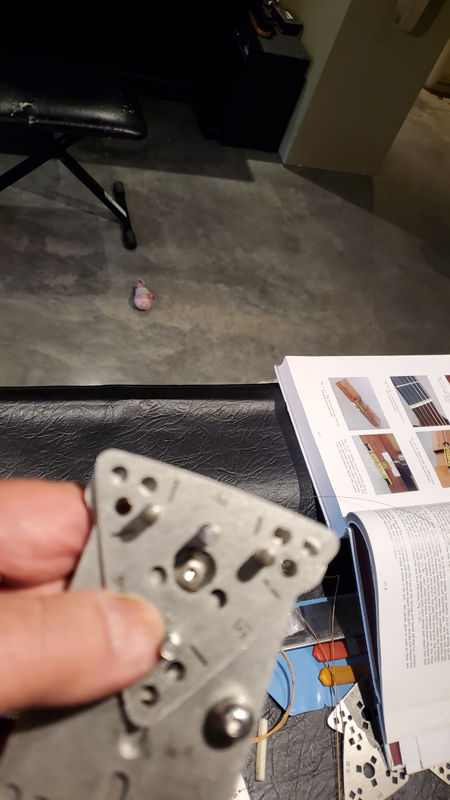
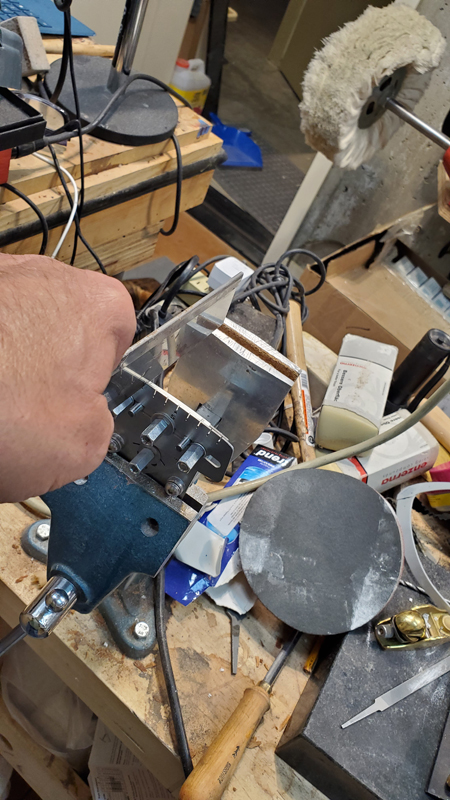
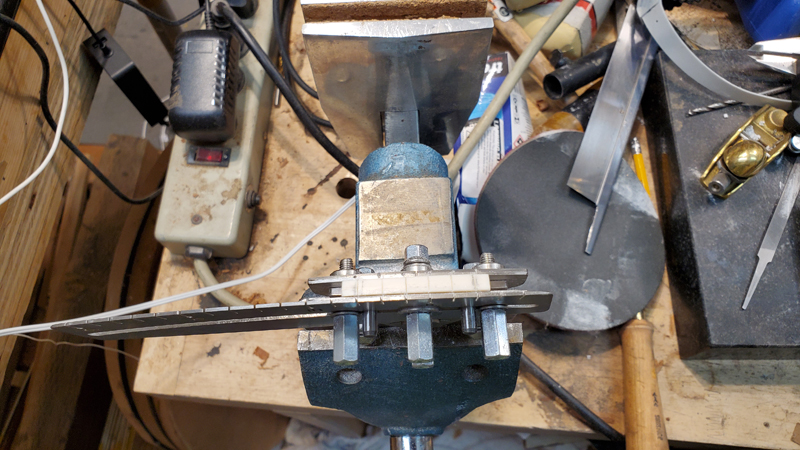
I then remove the string spacing guide and file the nut slots with my nut files. The template is still used as a guide when filing for depth. The jig includes a jet of gauge wires that can be used to pick the nut up a touch and allow deeper slots. I do not use them I let the tool get close and I fine tune on the guitar.
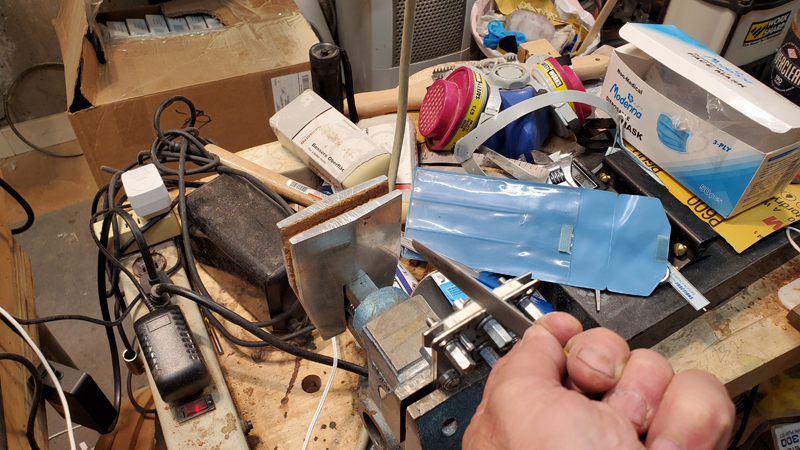
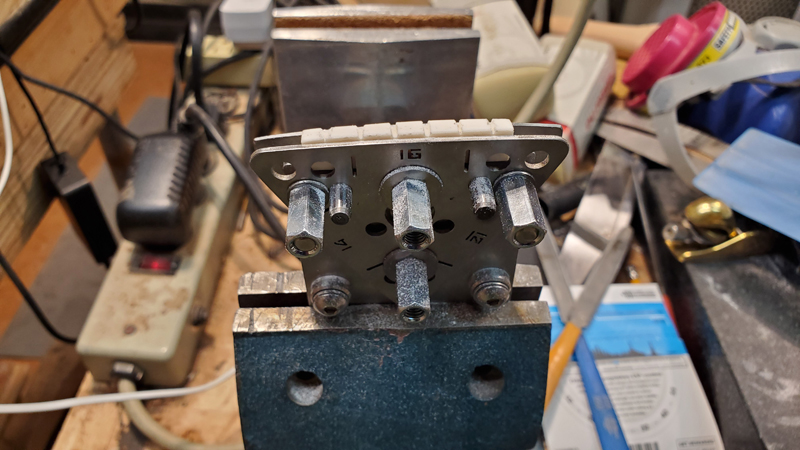
As my pyramid bridge is pretty standard, I had a saddle just the right size that I stuck in and I strung the guitar with the newly made nut.
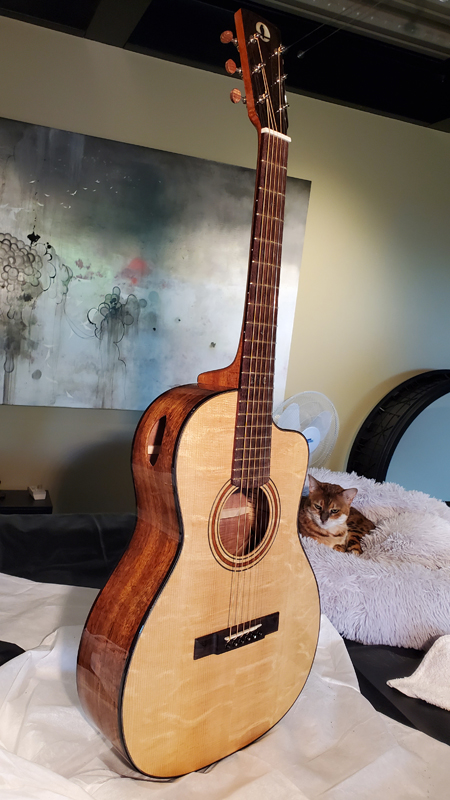
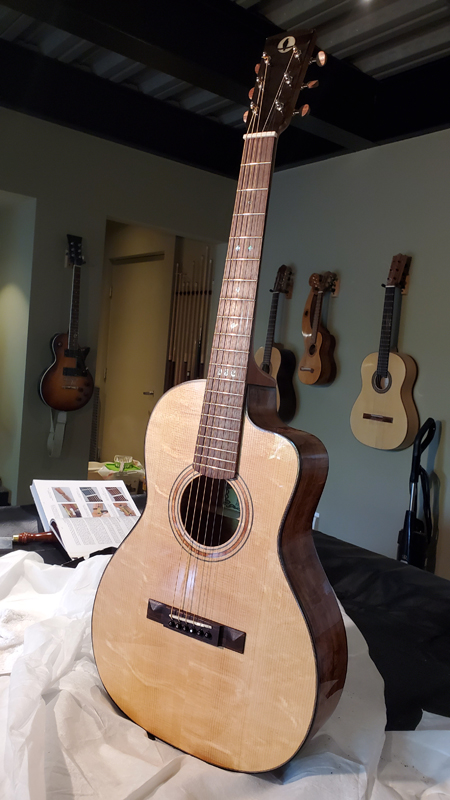
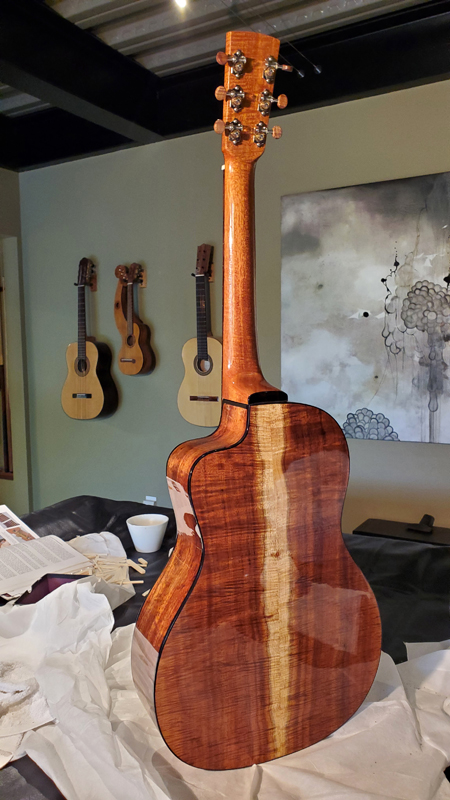
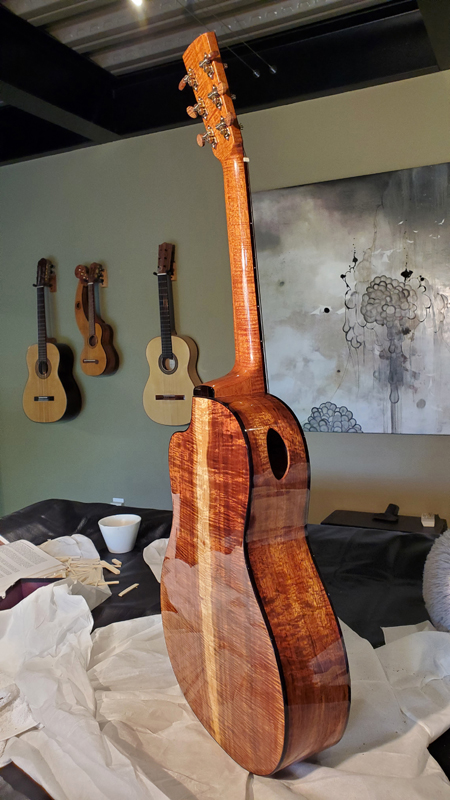
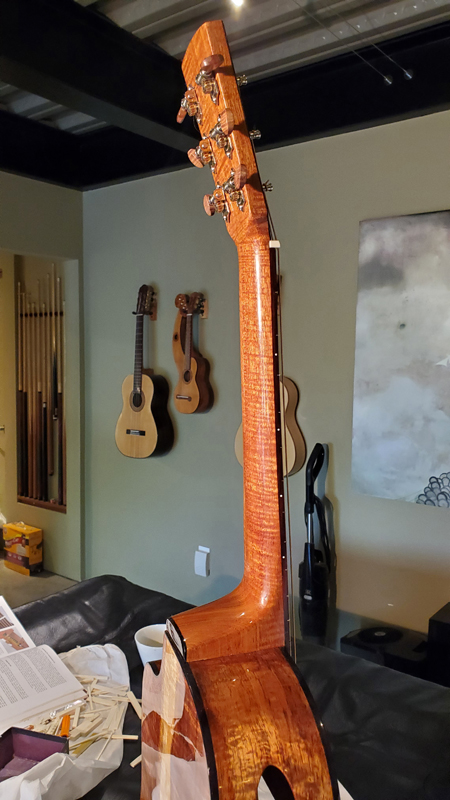
It sounds like a guitar! I have it hanging and with fine tune the setup in a day or two.
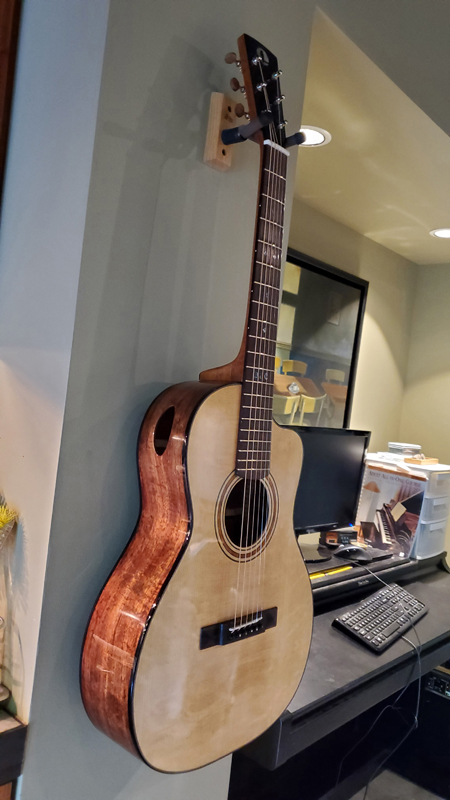
I have strung up the guitar. Mostly straight forward construction. I did a good job masking the bridge area. To remove the tape I put the bridge in place with the index pins, scored the finish around the bridge with a scalpel and lifted the tape from the center. I did a touch of clean up with a chisel and level sanded the finish around the bridge. With the tape slightly high the finish was not completely leveled close to the bridge. With all in place I glued it on with my vacuum clamp.





I use my Luthiers Friend Thickness Sander to take my nut blank to a tight fit. I leave it tight enough so that I can clean the bone with some 400 grit sandpaper.

With the nut thicknessed and cut to length I use a jig from GMC Luthiers Tools to help make the nut. The tool is really cool it is adjusted to the depth of the nut slot and uses two separate sized templates to first shape the nut for height and the second template is for the depth of the nut slot.
Two templates one slightly bigger than the other

Use the larger template in their nut vice to size the nut.

With the nut sized I string the two E strings to mark where I want them.

I switch out to the string height template and install the correct string spacing guide. With the E strings marked I just pick the slots in the guide that gives me six strings and lines up with the two E strings. I cut all of the slots to depth with a razor saw.



I then remove the string spacing guide and file the nut slots with my nut files. The template is still used as a guide when filing for depth. The jig includes a jet of gauge wires that can be used to pick the nut up a touch and allow deeper slots. I do not use them I let the tool get close and I fine tune on the guitar.


As my pyramid bridge is pretty standard, I had a saddle just the right size that I stuck in and I strung the guitar with the newly made nut.





It sounds like a guitar! I have it hanging and with fine tune the setup in a day or two.

